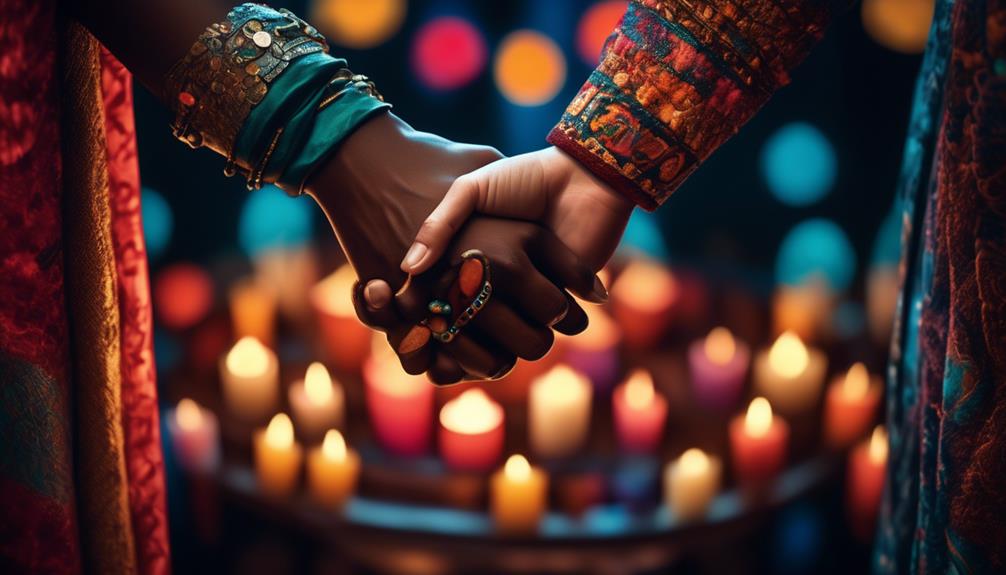What Is the Impact of Culture on Love?

Culture shapes our understanding of love and defines what is considered acceptable or desirable in romantic relationships. It influences our beliefs about gender roles, marriage, and the importance of family. For example, in some cultures, arranged marriages are the norm, while in others, individual choice and romantic love are emphasized. Cultural norms also impact our expectations for expressing love and affection, such as the appropriate level of physical intimacy or the use of verbal declarations of love. Additionally, cultural values and beliefs about love can affect how we handle conflicts and make decisions in our relationships. Overall, culture plays a significant role in shaping our experiences and understanding of love in romantic relationships.
Defining Love in Different Cultures
Different cultures have distinct and often conflicting definitions of love. When it comes to cross-cultural comparisons, it becomes apparent that the perspectives on love vary greatly. In some cultures, love is seen as a romantic and passionate emotion that's solely reserved for one's partner. However, in other cultures, love extends beyond the boundaries of romantic relationships and encompasses a broader sense of community and interconnectedness.
For instance, in collectivist cultures, such as those found in many Asian countries, love is often viewed as a duty and responsibility towards one's family and community. It's seen as a selfless act of service and sacrifice for the greater good of others. In contrast, individualistic cultures, such as those prevalent in Western societies, tend to prioritize personal happiness and fulfillment in romantic relationships.
These cultural perspectives on love can lead to misunderstandings and conflicts when individuals from different cultures come together. What may be considered an expression of love in one culture may be perceived as suffocating or distant in another. It's essential to recognize and respect these differences in order to navigate and build meaningful relationships across cultures.
Cultural Expectations in Romantic Relationships
You think you're in control of your romantic relationship, but let's be real – culture has a say in it too. From the expectations and roles assigned to each partner to the rituals and traditions that shape the relationship, your culture plays a significant role in how your romance unfolds.
And it doesn't stop there – even who you're attracted to can be influenced by the cultural norms and values ingrained in you from birth.
Relationship Norms and Roles
Relationship norms and roles in romantic relationships are shaped by cultural expectations, dictating the behaviors and responsibilities of individuals involved. These cultural expectations impact the dynamics of relationships and the way love is expressed. Here are two subtopics to delve into:
- Gender Roles:
- In some cultures, traditional gender roles are strictly followed, with men expected to be the breadwinners and women expected to be homemakers.
- However, in other cultures, there's a shift towards more equality, with both partners being responsible for financial and domestic duties.
- Expressions of Affection:
- Cultural expressions of affection vary greatly. In some cultures, public displays of affection are frowned upon, while in others they're openly embraced.
- Different cultures also have different ways of expressing love and affection, such as through gestures, words, or gifts.
Understanding these relationship norms and roles is crucial in navigating cultural differences and building healthy, fulfilling relationships.
Relationship Rituals and Traditions
Cultural expectations in romantic relationships dictate a set of rituals and traditions that heavily influence the dynamics of love. Relationship customs and cultural practices play a significant role in shaping how individuals express their love and commitment to one another. These customs can range from the way couples celebrate anniversaries to the expectations around marriage proposals and wedding ceremonies.
In some cultures, there are specific rituals that couples must undergo before they can be considered married. These rituals can include parental approval, dowry exchanges, or even elaborate engagement ceremonies. These traditions not only serve as a way to solidify the bond between partners but also to establish their relationship within the wider cultural context.
While some may view these practices as outdated or unnecessary, for others, they hold deep cultural and symbolic significance. Understanding and respecting these rituals is crucial for building strong and harmonious relationships that honor cultural traditions.
Cultural Influence on Attraction
In the realm of romantic relationships, cultural expectations wield a powerful influence over the way individuals are attracted to one another. Cultural preferences play a significant role in shaping our attraction towards others.
Here are two sub-lists to draw you in and keep you interested:
- Cultural preferences in attraction:
- Physical appearance: Different cultures have varying standards of beauty, which influence our preferences in terms of physical attractiveness.
- Personality traits: Cultures often prioritize certain personality traits, such as confidence, kindness, or ambition, which can shape our attraction towards others.
- Cross-cultural relationships:
- Challenges: When entering a relationship with someone from a different culture, there can be challenges in understanding and navigating cultural differences.
- Opportunities: Cross-cultural relationships offer an opportunity for personal growth, learning, and embracing diversity.
Understanding the cultural influence on attraction is crucial in building successful and fulfilling relationships in our diverse world.
The Influence of Cultural Beliefs on Love
You think cultural beliefs have no influence on love? Think again.
Cultural norms play a significant role in shaping our understanding and experience of love. From arranged marriages to strict gender roles, cultural expectations can either enhance or hinder our ability to form meaningful and authentic connections with others.
Cultural Norms and Love
Beliefs about love vary across cultures, shaping the way individuals perceive and experience romantic relationships. Cultural norms play a significant role in defining what's considered acceptable or unacceptable in love.
Here are two key aspects to consider:
- Cultural diversity in love:
Different cultures have distinct views on love, which can range from arranged marriages to open relationships. These diverse perspectives reflect the values, traditions, and social structures of each culture.
- Cross-cultural relationships:
When individuals from different cultural backgrounds enter into a romantic relationship, they must navigate the complexities of merging their beliefs and expectations. This can lead to both enriching and challenging experiences as couples negotiate their cultural differences.
Understanding and respecting cultural norms is essential for promoting healthy and harmonious relationships in our increasingly diverse world. It requires empathy, open-mindedness, and a willingness to learn from and adapt to different perspectives.
Cultural Expectations and Love
Shattering preconceived notions, cultural beliefs regarding love exert a powerful influence on individuals' expectations and experiences within romantic relationships. When it comes to cross cultural comparisons, it becomes evident that different cultures have varying expectations and norms surrounding love.
Cultural influences on love languages further highlight how cultural beliefs shape the way we express and interpret love. For example, in some cultures, love may be expressed through physical touch and affection, while in others, it may be shown through acts of service or verbal affirmations.
These cultural expectations can create misunderstandings and challenges within relationships, as individuals from different cultural backgrounds may have different love languages and expectations. It's important to acknowledge and understand these cultural influences in order to navigate and build healthy, fulfilling relationships across cultures.
Cultural Norms and Relationship Dynamics
Cultural norms greatly influence the dynamics of relationships. They shape how we communicate and perceive love, as well as how we navigate challenges such as infidelity. Here are two ways cultural norms impact relationship dynamics:
- Cultural influences on communication: Different cultures have distinct communication styles that can greatly affect relationships. For example, in some cultures, direct communication is encouraged, while in others, indirect communication is preferred. These differences can lead to misunderstandings and conflicts between partners who've contrasting cultural backgrounds. Understanding and respecting these cultural differences is crucial for fostering healthy communication and maintaining a strong relationship.
- Cultural perspectives on infidelity: Infidelity is viewed differently across cultures, and this can have a significant impact on relationship dynamics. In some cultures, infidelity is considered a grave betrayal and can lead to the end of a relationship, while in others, it may be more tolerated or forgiven. These cultural perspectives on infidelity can shape the expectations and boundaries within a relationship, as well as influence how couples navigate issues of trust and fidelity.
Love and Cultural Expressions
Love is a universal human experience that takes on unique cultural expressions. Cultural symbolism plays a significant role in how love is expressed and understood across different societies. From gestures and rituals to art and literature, every culture has its own way of representing and celebrating love. These cultural expressions shape our understanding of love and influence the way we experience and express it ourselves.
Cross-cultural love stories are a testament to the power of love to transcend cultural boundaries. They often depict the challenges and complexities that arise when individuals from different cultural backgrounds come together. These stories highlight the clash of traditions, beliefs, and values, but also the potential for growth, understanding, and unity. They illustrate the beauty of love's ability to bridge gaps and bring people together, despite their cultural differences.
Love and cultural expressions go hand in hand, as they reflect the diversity and richness of human experiences. They remind us that love isn't limited by cultural boundaries but is a force that can connect people from all walks of life. By appreciating and embracing the cultural expressions of love, we can deepen our understanding and celebrate the universal nature of this profound human emotion.
The Role of Cultural Values in Love
The values ingrained within a culture play a pivotal role in shaping the dynamics and expectations of love. Cultural values influence how individuals perceive commitment and navigate romantic relationships. Here are two subtopics that shed light on the role of cultural values in love:
- Cultural Perspectives on Commitment:
- In some cultures, commitment is seen as a lifelong dedication to one person, emphasizing loyalty and stability.
- Other cultures may have more fluid perspectives on commitment, valuing personal growth and individual freedom in relationships.
- Cross Cultural Love Stories:
- Cross cultural love stories often highlight the clash of cultural values and the challenges faced by couples from different backgrounds.
- These stories explore the complexities of blending cultural values and expectations, showcasing the importance of open-mindedness and compromise in love.
Understanding the role of cultural values in love is crucial for building healthy and fulfilling relationships. It allows us to appreciate the diversity of perspectives and expectations that exist across cultures. By embracing these differences and finding common ground, we can navigate the challenges that arise in cross cultural relationships and create lasting connections.
Cultural Traditions and Rituals of Love
Now let's dig into the fascinating world of cultural traditions and rituals surrounding love. Love is a universal concept, but its expression varies greatly across different cultures. In order to truly understand the impact of culture on love, we must examine how love is defined and the cultural expectations that shape romantic relationships.
| Cultural Traditions | Rituals of Love |
|---|---|
| In Indian culture, arranged marriages are still prevalent. Love often develops after the marriage is arranged, and couples work towards building a strong foundation based on commitment and mutual respect. | In Japan, the exchange of gifts, such as chocolates, plays a significant role in expressing love on Valentine's Day. On White Day, one month later, men are expected to reciprocate the gesture with gifts of equal or greater value. |
| In Western cultures, romantic love is often emphasized. The idea of finding one's soulmate and experiencing intense passion is deeply ingrained in societies. | In China, the Qixi Festival, also known as the Chinese Valentine's Day, is celebrated. On this day, couples pray for happiness and longevity, and single women perform rituals to find love. |
| In some African cultures, polygamy is accepted, and multiple wives are seen as a symbol of wealth and status. Love may be shared among the wives, and the focus is on maintaining harmony within the family. | In Mexico, the tradition of Las Mañanitas involves serenading a loved one in the early morning hours to express affection and devotion. |
These cultural traditions and rituals shape our understanding of love and influence our expectations in romantic relationships. By examining different cultural practices, we can broaden our perspective and appreciate the diverse ways in which love is expressed and experienced around the world.
Love and Cultural Identity
Cultural identity plays a significant role in shaping our understanding of love and influencing our expectations in romantic relationships. Our cultural background affects the way we perceive love, marriage, and relationships. Here are some thought-provoking insights on love and cultural identity:
- Cultural influences on marriage:
- In some cultures, arranged marriages are still a common practice. This means that love and romance may not be the primary factors in choosing a life partner.
- In other cultures, love marriages are celebrated, where individuals have the freedom to choose their partners based on romantic love and personal compatibility.
- Cultural perspectives on love:
- Different cultures have diverse notions of love. For example, in some cultures, love is seen as a selfless sacrifice and devotion to one's partner and family.
- In contrast, individualistic cultures tend to prioritize personal happiness and satisfaction in love relationships.
Understanding cultural influences on love and marriage is crucial for building strong and harmonious relationships. It helps us appreciate the diversity of love expressions and challenges our own preconceived notions of what love should be. By embracing cultural perspectives on love, we can foster empathy, understanding, and acceptance in our relationships.
Frequently Asked Questions
How Does Love Differ Between Different Cultures?
Love differs between cultures in terms of values, expectations, and expressions. Cross-cultural dating can bring both challenges and rewards. Cultural influences shape marriage and family structures, impacting how love is understood and experienced.
What Are Some Common Cultural Expectations in Romantic Relationships?
In romantic relationships, cultural influences shape expectations and expressions of love. Different cultures have their own norms and values, which can lead to varying beliefs about commitment, gender roles, and displays of affection.
How Do Cultural Beliefs Influence the Way Love Is Perceived and Experienced?
Cultural beliefs shape the way you perceive and experience love. From cultural stereotypes to cross-cultural relationships, your beliefs influence your expectations, behavior, and understanding of love. It's controversial, but it's true.
How Do Cultural Norms Affect Relationship Dynamics?
Cultural norms heavily influence relationship dynamics. Gender norms play a significant role in shaping these dynamics. Cultural barriers can hinder intercultural relationships, making it challenging to navigate and understand different cultural perspectives on love.
What Are Some Cultural Traditions and Rituals Associated With Love in Different Cultures?
In different cultures, love is celebrated through diverse cultural symbols and wedding traditions. From the vibrant festivities of an Indian wedding to the intricate rituals of a Japanese tea ceremony, love is expressed uniquely across the globe.










